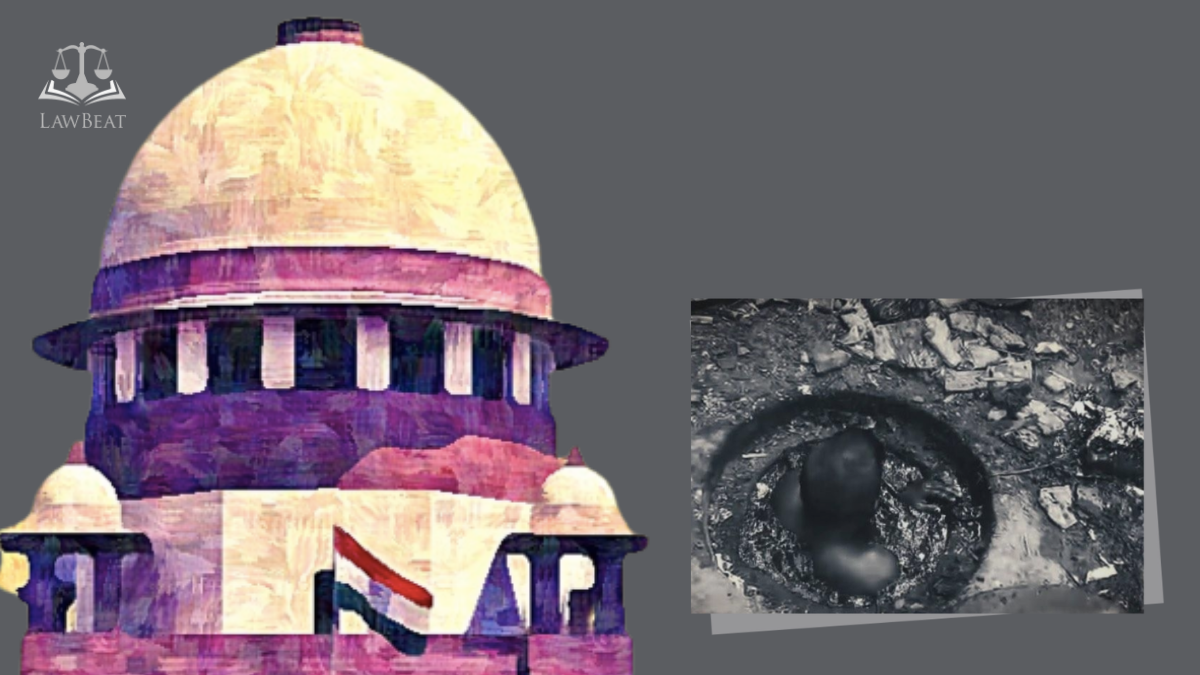Supreme Court To Hear Plea Seeking Ascertainment Of Issues Related To Manual Scavenging In August

The Supreme Court on Monday issued notice in a plea seeking ascertainment of issues related to manual scavenging
A Full Judge Bench comprising Chief Justice, Justice AS Bopanna & Justice V Ramasubramanian stated that it shall take up the case in third week of August.
At the last date of hearing, after observing that the matter was serious, the Bench asked all the states & UT’s to file their reply within four weeks.
“The Manual Scavengers are subjected to inhuman working conditions by being exposed to diseased sewages and pits; wherein the said scavengers are forced to work without any protective gears. The aforementioned unsafe working conditions result in either the manual scavengers contracting chronic or acute diseases or suffering injuries, for which no medical-care facilities are in place; or may result in the unfateful and untimely demise of the manual scavengers, wherein in majority of the cases even compensation by the concerned State is not awarded to the next of kin.”, the plea filed by Criminal Justice Society of India stated.
In the present matter, the petitioner filed a writ petition in the nature of PIL for issuance of a writ of mandamus directing the Respondents to ascertain the actual number of persons employed or engaged either directly or indirectly as manual scavengers & actual number of death of such persons since its prohibition in 1993 by enactment of The Employment of Manual Scavengers and Construction of Dry Latrines (Prohibition) Act, 1993. The petitioners also pray for directing the respondents to initiate an investigation & subsequent criminal proceedings u/s 304 IPC, 1860 against the erring officials, contractors or any other person deemed fit & proper by the Court.
The plea was filed in the interest of Right to Dignity, Right to Life & Right to Safety enshrined under Art 21 of the manual scavengers in the light of increasing number of fatalities & accidents posing an unwarranted life hazard in employment which is strictly prohibited by law on the following grounds:
- The Prohibition of Employment as Manual Scavengers and their Rehabilitation Act,2013 (“2013 Act”) u/s 5 penalises the construction of insanitary latrine and direct or indirect employment of persons as manual scavengers; demolition of existing insanitary latrines or conversion to sanitary latrines and non-termination of any contract, instrument or agreement for employment of manual scavenging executed before the commencement of the Act u/s 6. Furthermore, the Act u/s 7 provides penal provisions for local authority or agency engaging or employing a person directly or indirectly for hazardous cleaning of a septic tank or sewer, one year after the commencement of the Act.
- Despite the prohibitory ban on employment as manual scavengers and ban on construction of insanitary latrines under the 2013 Act, as evidenced by the above mentioned articles published in The Wire dated 15.06.2018 , The Indian Express dated 20.06.2018 , The CSRJournal dated 16.08.2018 and Down To Earth publication dated 11.09.2018 reported that as of 2017 in about 121 districts out of 600 districts, barring the largest employer, the Indian Railways, over 50,000 persons were reportedly engaged as manual scavengers, whereas in reality the figure is much higher. Further, the existence of 26 Lakh dry latrines in the country contravenes section 5,6 & 7 of 2013 Act & liable for punishment u/s 8 & 9 of the Act.
- Death of the manual scavengers resulting from exposure to hazardous conditions tantamount to violation of Right to Safety, Right to Dignity and Right to Life as enshrined under Article 21 of the Constitution of India
- Inability of the Respondents to eliminate manual scavenging in totality despite existing legislations and instances of fatal accidents tantamount to violation of the State’s duty to promote welfare of persons (Article 38), policies towards health of workers (Article 39), provision for just and humane conditions of work (Article 42), provision for a decent standard of living (Article 43), and protection of weaker sections of the Society (Scheduled Castes and Scheduled Tribes from social injustice (Article 46) of the Constitution of India
- In light of the hazardous conditions that manual scavengers are exposed to, the local authorities, officials, agencies, contractors or any other person engaging a manual scavenger either directly or indirectly is deemed to have knowledge that death is a likely consequence
- The erring official, agency, contractor or any other person who either directly or indirectly engages a manual scavenger whose untimely death is resultant of the same, thereby the erring official, agency, contractor or any other person are liable to be charged u/s 304 of the Indian Penal Code, 1860
The plea also emphasizes on the lack of political will to deal with the issue of manual scavenging & the ineffectiveness of the legislations for abolishing this practice.
Further, the petitioners have also relied on Cooper v. Union of India, AIR 1970 SC 564, Paramanda Kataria v. Union of India AIR 1989 SC 2039, Francis Coralie v. Union Territory of Delhi AIR 1981 SC 746,Avishek Goenka vs Union Of India & Anr (2012) 5 SCC 321, Khudiram Das v. State of West Bengal , AIR 1975 SC 550 to contend that citizens have the right to life i.e to live with dignity, freedom & safety as per Article 21 of the Constitution of India.
“The inhuman practice of manually removing night soil which involves removal of human excrements from dry toilets with bare hands, brooms or metal scrappers; carrying excrements and baskets to dumping sites for disposal, cleaning septic tanks and sewers is not only diabolic but is perhaps the highest degree of human rights violation.”, the plea also states.
Case Title: Criminal Justice Society of India v. Union of India & Ors|W.P (Crl) 20 of 2019
